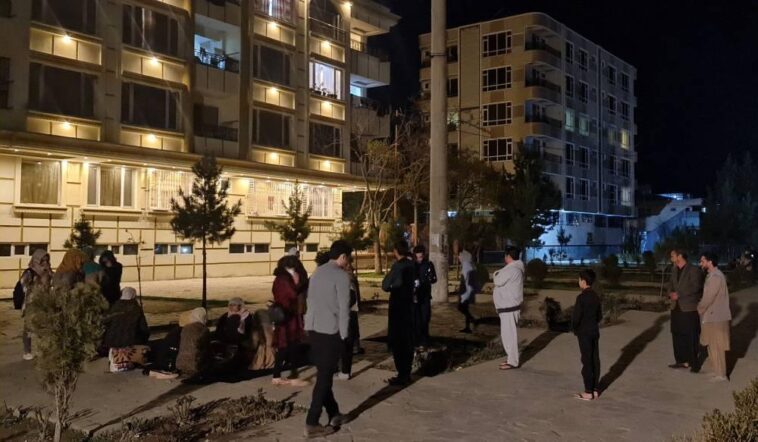Kabul: At least 12 people were killed in Afghanistan and Pakistan by a powerful earthquake that was felt across thousands of kilometres, but the region appeared to have avoided the widespread devastation typically associated with an earthquake of this magnitude.
The United States Geological Survey reported that the magnitude 6.5 earthquake was centred near Jurm in northeastern Afghanistan; however, the quake’s depth of 187 kilometres (116 miles) prevented extensive damage.
The tremor, which occurred on Tuesday at approximately 9:30 p.m. (1700 GMT) Kabul time and lasted more than 30 seconds, was felt from central Asia to New Delhi.
“We anticipated maximum damage due to the intensity of the earthquake, so we issued an alert,” said Bilal Faizi, a spokesman for Pakistan’s emergency Rescue 1122 service in Khyber Pakhtunkhwa, in an interview with AFP.
“Fortunately, our concerns proved to be unfounded. The magnitude of the earthquake caused residents to alarm, but the damage was minimal.”
The Hindu Kush mountain range, which lies near the junction of the Eurasian and Indian tectonic planes, is particularly prone to earthquakes.
Stayed awake the entire night
Despite its proximity to the epicentre, a resident of one village in the Jurm district reported no casualties.
“There are between 2,000 and 3,000 people in our village, and we all slept outside under the stars,” said Inamullah when reached by phone.
We were all terrified and remained awake throughout the night.
Residents of cities and villages in Afghanistan and Pakistan fled their homes in search of safety away from structures, with many unable to return.
Neda Raihan, a 24-year-old student in Kabul, told AFP, “We spent the night in our courtyard. Although it was chilly outside, we chose to stay out rather than return home.”
The massive residential complex Khudadad Heights in the Pakistani capital was evacuated after massive fissures appeared.
Last month’s earthquake in southeastern Turkey and portions of Syria killed over 55,000 people, heightening fears throughout the region.
“The children began screaming that an earthquake had occurred. We were all out. The earthquake’s devastation in Turkey and neighbouring nations had a profound impact on our nerves “Ikhlaq Kazmi, a retired professor from Rawalpindi, Pakistan, stated as much.
Officials in Khyber Pakhtunkhwa province, located north of the Pakistani capital, reported that two women and two children were among the nine victims of the earthquake.
High acuity
In Afghanistan, officials reported three fatalities and forty-four injuries; however, phone and internet connections to remote areas of the country were severed and communication was sporadic.
Government spokesman Zabihullah Mujahid stated that all of the nation’s medical facilities had been placed on high alert.
Noor Mohammad Hanifi, a shopkeeper in the Afghan capital Kabul, pitched shelters in the street for his family to spend the night.
“Nobody dares to enter their homes,” Hanifi told AFP as his family sought refuge under blankets.
When the earthquake struck Afghanistan, many families were out commemorating Nowruz, the Persian New Year.
“I heard screams and shouts as people ran out into the streets,” said Masieh, who was outside with his family when the earthquake struck.
It is feasible that another earthquake will occur, so I am still waiting outside.
Those who were inside their homes and apartments also fled swiftly.
“They just fled barefoot, carrying their infants in their arms,” an AFP correspondent reported.
Prime Minister Shehbaz Sharif of Pakistan instructed the National Disaster Management Authority to be prepared for any emergency.
Also read: US Has Significant Concerns Regarding China’s Behavior: White House
A 5.9-magnitude earthquake, the deadliest in Afghanistan in nearly a quarter century, struck the impoverished province of Paktika in June, killing more than a thousand people and rendering tens of thousands destitute.
The Taliban’s takeover of the country in August of 2021 has exacerbated Afghanistan’s humanitarian crisis.
After the takeover, the South Asian country lost access to the international development financing on which it relied, and its foreign assets were frozen.




